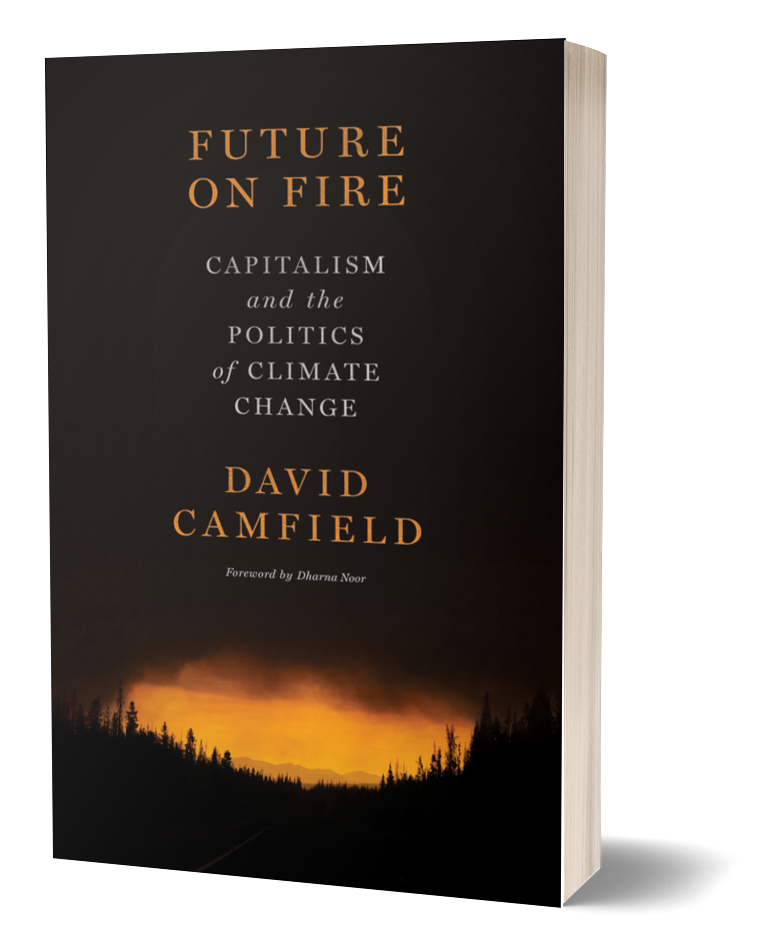By Ron Jacobs
Counterpunch
January 20th, 2023
I like clarity. On the question of the politics of climate change under capitalism, David Canfield’s new book Future on Fire: Capitalism and the Politics of Climate Change provides exactly that. In addition, the book is brief and very much to the point. The topic is climate change, the target is the system of capitalism and the point is that the issue is a political issue and that political power is what will halt humanity’s quickening race to self-destruction. Not the political power of politicians and bureaucrats who suckle on capitalism’s teat, but the political power of social movements; social movements that are slowly but surely being built. Social movements that require tenacity, a political and economic understanding of how the powerful see the planet and its residents, and reject corporate and other non-solutions to the crisis.
Camfield begins this text with a reminder of where the planet is at the current moment. He discusses heat rise and the need to curtail CO2 emissions. Reasons why the planet is experiencing rapid increases in both are looked at and placed in perspective: population growth, economic growth, fossil fuels. Naturally, each of the reasons he presents are elements that contribute to the crisis. Addressing one or the other of them might help but, as Camfield makes abundantly clear, the primary culprit in the demise of the planet as we know it is the economic system of capitalism; its exploitation of the environment, of human labor and, most importantly, its need to constantly expand in order to survive. The metaphor of cancer is an appropriate and oft-used one when it comes to acknowledging capitalism’s destruction. What cancer cells do to the human body is what capitalism is doing to the planet and the multiple environmental systems it requires to exist as a healthy entity.
Given this, it becomes quite obvious that capitalism must go. Like others sounding the alarm on climate change and its effect on humans and the planet we live on, Camfield makes explicit that those who will suffer first (and probably the most) are those most at the mercy of capitalism. He explains it like this: “As rising waters, drought, and other effects of climate change drive more people to move, the impact on people will depend on their wealth and power.”(5) Expanding outward, his dynamic is applied to communities and even entire populations living in certain regions on earth. Therefore, he argues, the most effective way to address climate change must include a re-ordering of the social order. Already, we know the wealthiest among us are making plans to leave the rest of their fellow humans behind when the shit of climate disaster hits the fan. Some are thinking about moving to other planets while others just figure on heading to luxury fortresses in the hills.
Obviously, Camfield’s prescription is a tall order, especially when one considers the state of the movement addressing climate change today. At best, it is confused. There are those looking at a green new deal which in its most radical forms does demand a re-ordering of society. There are others hoping for something more moderate. Among the latter element and in many other manifestations of this movement, very few are seriously addressing the essence of the problem, pretending instead that capitalism is compatible with a livable future on earth. Even among those acknowledging the need for capitalism to go if climate change is to be seriously addressed, there are those that support capitalism’s wars. War and the preparation for war are some of the worst contributors to earth’s failing ecosystem, both in terms of the damage wars cause and the amount of money spent on them–money that could be used to address the negative effects of climate change.
One note of hope that Camfield sounds that others writing on the subject rarely address is that even if we don’t reach certain goals considered important to slowing down and ultimately halting climate change, the planet is still worth saving. In a chapter he titles “Even a Ravaged Planet is Worth Fighting For,” the author points out that the world will not end if those goals aren’t reached. This fact would make it even clearer that the need to restructure human society along lines that remove profit as its motivation even greater. There will still be billions of people living on the planet and their future would still need to be assured. The date of 2030 suggested by scientists and others as crucial to reducing greenhouse and other emissions is not an “end of the world” date, but a marker. While we should of course be organizing and fighting to come close to the goals symbolized by that date, we should also be thinking of our work beyond that date, especially since the possibility of warming over two percent seems more likely with each passing day. The defeat of capitalism and its replacement with a system based on humanity’s needs will be even more urgent, not less.
Ron Jacobs is the author of Daydream Sunset: Sixties Counterculture in the Seventies published by CounterPunch Books. His latest offering is a pamphlet titled Capitalism: Is the Problem. He lives in Vermont. He can be reached at: [email protected].







